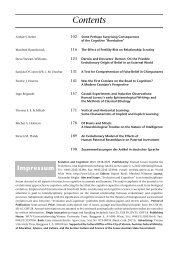The Seven Sins of Evolutionary Psychology - Konrad Lorenz Institute
The Seven Sins of Evolutionary Psychology - Konrad Lorenz Institute
The Seven Sins of Evolutionary Psychology - Konrad Lorenz Institute
Create successful ePaper yourself
Turn your PDF publications into a flip-book with our unique Google optimized e-Paper software.
Shulamith Kreitlertion—he said one day (I bring his views in a freeparaphrase <strong>of</strong> my notes from the time): “<strong>The</strong> cognitiveorientation theory is the extreme opposite <strong>of</strong> thebrand <strong>of</strong> behaviorism that I have developed andwhich came to be called SKINNERIANISM. It is oppositebecause it starts on the top, uses an apparently unparsimoniousset <strong>of</strong> theoretical concepts, assumesprimacy <strong>of</strong> the cognitive system, and attributes acentral role to cognition in the functioning <strong>of</strong> organisms.In contrast, SKINNERIANISM starts at the verybottom, uses an apparently monastically frugal set<strong>of</strong> a-theoretical concepts, does not accord any statusto the cognitive system, whose existence it barelyacknowledges and considers as a theoretical outrage,and attributes no role to it in the functioning <strong>of</strong> organisms.However, an integral part <strong>of</strong> the development<strong>of</strong> an approach in science (viz. theory) is to testits extensibility. <strong>The</strong>refore, I was intent to test howfar up the evolutionary ladder I can get, in order t<strong>of</strong>ind out how much I can explain with my theoreticallymeager tools on the higher levels <strong>of</strong> psycho–biological functioning. That’s why I tried to explaineven politics in behaviorist terms and why I wroteWalden Two, a book about a utopian society basedonly on operational conditioning. You should do thesame with the cognitive orientation theory, thoughin an inverse sense. Your task is to test how far downthe evolutionary ladder you can get with the cognitiveorientation theory, in order to find out howmuch you can explain with your theoretically richtools on the lower levels <strong>of</strong> psycho–biological functioningpreceding the human. Since you start with abig load <strong>of</strong> concepts, stepping down the evolutionaryladder should give you a chance to see whichcomponents developed and why. Frankly, I envy youthis task”. So, this is the task with which this paperdeals. Notably, the procedure suggested by SKINNERcorresponds to the use <strong>of</strong> evolutionary thinkingwithin the top-down system advocated by DEKAYand SHACKELFORD (2000). Handling this task was delayedso much probably because we had first to learnmuch more about the cognitive orientation theorybefore we could put it to the test <strong>of</strong> ‘extensibility’.Cognition: What It Is not and What It Is<strong>The</strong> basic thesis <strong>of</strong> the cognitive orientation (CO)theory is that cognitive contents and processes guidebehavior. Cognitive contents refer to information,beliefs, attitudes, opinions, values, and meanings inthe broad sense <strong>of</strong> the term, whereas cognitive processesare operations and transformations <strong>of</strong> differentkinds that deal with the production, testing,elaboration, transformation, analysis, storing,retrieval and uses <strong>of</strong> cognitive contents. Cognition,as defined above, is not restricted to any particularspecies and occurs on different evolutionary levels.In principle, we should expect its barest primarymanifestations in the simplest organisms (RIEDL1980, 1981, 1987).In order to understand better the role <strong>of</strong> cognitionin the motivational context, it is necessary to emphasizethat cognition does not entail rationality and noteven reasonableness. <strong>The</strong> fact that humans maythink rationally does not mean that they always ormostly do or that this kind <strong>of</strong> thinking prevails in themotivational context. Rationality constitutes one set<strong>of</strong> rules which may guide cognition, but there areother sets, such as Aristotelian logic, Boolean logic,mythological thinking, symbolic thinking, magicalthinking etc. (CASSIRER 1953; KREITLER 1965; LÉVI-STRAUSS 1979).Likewise, the involvement <strong>of</strong> cognition in motivationdoes not mean that motivation depends on orinvolves a decisional process which considers, for example,benefits and costs, advantages and disadvantages,pros and cons, weighing each carefully and calculatingthe end-result according to normativedecision rules (as some models <strong>of</strong> cognitive motivationassume, e.g., BECKER 1974; ROGERS 1983; RONIS1992).Further, cognition does not entail consciousness,nor is it a product or function <strong>of</strong> consciousness. Consciousnessis itself a function <strong>of</strong> cognition, and mayaffect cognitive functioning but is not a necessarycondition for cognition (KREITLER 1999). Cognitiveprocesses run their course without consciousness asmost other organismic processes. <strong>The</strong>y may becomeconscious to a certain extent, under specific conditions,when this subserves the needs <strong>of</strong> the organism.Similarly, cognition does not entail voluntary control.Though the exercise <strong>of</strong> so-called voluntary controlinvolves cognition, the involvement <strong>of</strong> cognitiondoes not mean that one has voluntary control overany aspect <strong>of</strong> the motivational dynamics <strong>of</strong> behavior.Finally, cognition is not restricted to the verbal medium.Indeed, cognitive processes may occur withoutrelying on any formal medium <strong>of</strong> expression, andwhen some <strong>of</strong> their aspects or end-results are expressedor communicated this may occur by means<strong>of</strong> any form <strong>of</strong> expression, verbal or nonverbal.So, given that cognition is not necessarily logical,reasonable, conscious, voluntarily controlled andverbal, which positive property can be attributed toit? We venture to suggest that it is meaning-dependent.Evolution and Cognition ❘ 82 ❘ 2001, Vol. 7, No. 1








